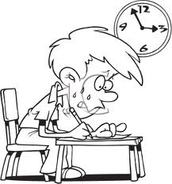Procedures: How Things Work in Ms. Aleman's Class
For anyone who missed the first day of school - or anyone who just wants to see this again:
Grading
In accordance with Lusher's grading policies, assignments will be weighted as follows:
In accordance with Lusher's grading policies, assignments will be weighted as follows:
- 10% = graded homework
- 10% = graded class work
- 60% = assessments: quizzes, tests, projects, papers, etc.
- 20% = quarterly exam

Absences
If you are absent (illness, sports games, family vacation, etc.), you are still responsible for all of the material covered in class. It is YOUR responsibility to make sure you are caught up.
Check the class notebook for missed notes. Talk to Ms. Aleman (NOT during a lesson) to make sure you have everything. You may also come at lunch or during office hours.
You will be granted a small extension (usually 1-3 days) to make up any missed assignments. See Ms. Aleman to find out when you will need to turn in your missed work.
In the case of a prolonged absence, you may be exempted from some assignments. You will need to make arrangements with Ms. Aleman.
If the absence is planned, please let your teachers know as soon as possible. That way, we may be able to get you your assignments ahead of time.
If you are absent (illness, sports games, family vacation, etc.), you are still responsible for all of the material covered in class. It is YOUR responsibility to make sure you are caught up.
Check the class notebook for missed notes. Talk to Ms. Aleman (NOT during a lesson) to make sure you have everything. You may also come at lunch or during office hours.
You will be granted a small extension (usually 1-3 days) to make up any missed assignments. See Ms. Aleman to find out when you will need to turn in your missed work.
In the case of a prolonged absence, you may be exempted from some assignments. You will need to make arrangements with Ms. Aleman.
If the absence is planned, please let your teachers know as soon as possible. That way, we may be able to get you your assignments ahead of time.

Test Corrections
If you are not happy with your score on a test or quiz, you may request a do-over.
If you are not happy with your score on a test or quiz, you may request a do-over.
- See Ms. Aleman for a Request to Retest form or print your own.
- Go to the LRC for extra tutoring. Make sure you have completed all homework and class work assignments related to the assignment. Complete two additional activities (study with a parent, attend office hours, etc.) to master the material.
- Bring your completed Request to Retest form to office hours. You will be asked to answer AND explain the questions that you missed during the initial assessment. Corrections will earn half the points of the original question.

Extra Credit
Most weeks, Ms. Aleman will assign an (optional) Academic Challenge.
If you choose to complete the Academic Challenge, you must turn it in to Ms. Aleman by the Friday of the week in which it was assigned. If you complete it correctly, you will earn 1 bonus point.
Bonus points can be applied to any graded assignment, other than exams, and are worth +1%. Bonus points are not transferable to other students or other classes, but you may use them any time throughout the year.
Most weeks, Ms. Aleman will assign an (optional) Academic Challenge.
If you choose to complete the Academic Challenge, you must turn it in to Ms. Aleman by the Friday of the week in which it was assigned. If you complete it correctly, you will earn 1 bonus point.
Bonus points can be applied to any graded assignment, other than exams, and are worth +1%. Bonus points are not transferable to other students or other classes, but you may use them any time throughout the year.
Honor Code (as laid out in the Middle School Handbook)
Students are responsible for reading, understanding, and complying with this code of conduct. They are also required to understand and follow expectations outlined by teachers for specific assessments. When in doubt, students are also responsible for asking the teachers for clarification on points relating to all aspects of assignment expectations including, but not limited to, acceptability of collaboration.
Academic dishonesty is defined as the use of unauthorized aid or an attempt to pass off borrowed or uncited ideas as one’s own on any kind of assessment, regardless of intention.
Types of Academic Dishonesty and Their Consequences.
Complicity is the knowledge of an inappropriate use of material (i.e. knowledge of OTHER students' cheating) or receipt of illicit materials without alerting a teacher or dean.
- On my honor, I have neither given nor received any unauthorized aid on this assignment/assessment.
- I will not lie, cheat, plagiarize, or steal in my academic endeavors, nor will I accept the actions of those who do.
- I will conduct myself responsibly and honorably in all my activities as a member of the Lusher Charter School community.
Students are responsible for reading, understanding, and complying with this code of conduct. They are also required to understand and follow expectations outlined by teachers for specific assessments. When in doubt, students are also responsible for asking the teachers for clarification on points relating to all aspects of assignment expectations including, but not limited to, acceptability of collaboration.
Academic dishonesty is defined as the use of unauthorized aid or an attempt to pass off borrowed or uncited ideas as one’s own on any kind of assessment, regardless of intention.
Types of Academic Dishonesty and Their Consequences.
Complicity is the knowledge of an inappropriate use of material (i.e. knowledge of OTHER students' cheating) or receipt of illicit materials without alerting a teacher or dean.
- First offense: Detention from teacher
- Second offense: Referral to Dean’s office - detention
- Third offense: Referral to Dean’s office - detention(s)/possible suspension
- First offense: Grade level detention; redo assignment (letter grade reduction)
- Second offense: Referral to Dean’s office - detention; redo assignment (75% maximum grade)
- Third offense: referral to Dean’s office - detention(s)/possible suspension; redo assignment (but earn 0 points)
- Taking or sharing copies of assessments and/or another student’s work. (This includes homework/classwork!)
- The use of any unauthorized study resource to assist in completion of any assessment.
- Submitting the work of others as one’s own.
- Invention, distortion, or misrepresentation of information (false citations, etc.).
- Plagiarism: Using the words and ideas of others within one’s work without permission and/or citation.
